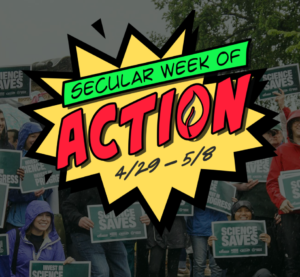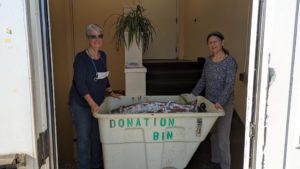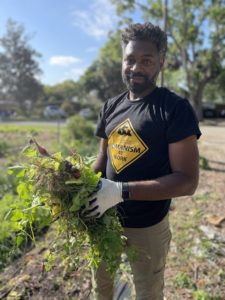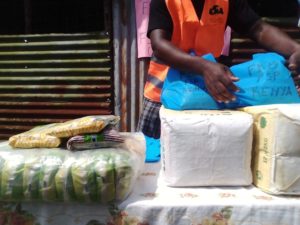Humanists Take Action

For humanists and others without supernatural belief systems, ethical values are most effectively expressed through tangible, meaningful acts. Actions have the potential to inspire and engage a broad range of people in a way that declarations of ideology cannot. Likewise, sharing experiences of giving and service with others can help elevate discourse about issues of fundamental human rights.
Secular Week of Action (SWoA)—held this year from April 29th to May 8th—creates a space where these actions can flourish. It’s a singular opportunity for secular groups to organize service events on a worldwide scale and point people toward meaningful ongoing volunteer activities in their communities. At a time where many humanists feel bogged down by the weight of seemingly insurmountable national and global issues, SWoA serves as a reminder that we as individuals still hold a surprising amount of power to positively impact the lives of others.

Humanist Society of Greater Phoenix makes and distributes sleeping mats for unsheltered people
“We’re trying to inject compassion and empathy and show there’s still good, still reason for hope in the community around us,” says Alex Zygmunt, president of Humanist Society of Greater Phoenix in Arizona. This year, Alex’s group is packing emergency food boxes, collecting hygiene supplies, and fundraising to supply period products for people in need. “We can still be good to one another without the need for appealing to a higher power. If you want to see good in the world, you have to put actions to your words. Show that you’re willing to do the work rather than say you want all these utopian ideas to be actualized, to then find out what you want is actually harming people. From a humanist perspective, we want to see the actions we take have a fruitful end rather than promising something we can’t back up.”
SWoA intentionally overlaps with the federally-recognized National Day of Prayer on the first Thursday of May, during which the president is required, by law, to sign a proclamation encouraging citizens to pray. This observance conflates a specific religious practice with civic virtue, dividing people along sectarian lines and discriminating against nonreligious people (as well anyone else who thinks prayer falls short of sufficiently addressing our nation’s challenges).
Secular Week of Action, on the other hand, calls on all people to participate in civic life through volunteerism.
“From an organizational perspective, it’s been very good,” continues Alex. “Essentially, coming together for a common cause has been a way to rally people to community. It’s not just that we want to do a nice thing. It’s a way for people to connect, to share each other’s stories. It’s networking, showing we have commonality here. In my former religious days, we used to call that fellowship. It’s just a secular form of that now. Instead of bowing our heads and praying, we’re doing something.”
This year’s theme tackles an ongoing but solvable crisis in the United States: homelessness. In the midst of a housing crisis, where rents are increasing as much as thirty percent in many metro areas, eviction rates and homelessness are national emergencies that can only be solved with human action—regardless of whether or not it is divinely inspired.
Currently, there is no county anywhere in the US where a renter working full time at minimum wage can afford the median cost of a two-bedroom apartment. Rent prices have increased an average of fourteen percent since 2018, and many metro areas saw rent price increases of more than sixty percent. Last year, nearly a quarter of all renters reported being behind on their rent, and more than half of those expected to be evicted within two months.
Federal assessments show that on a single night in 2021, 326,000 people experienced sheltered homelessness and that the number of those without shelter had risen thirty percent since 2015—estimated now at about 217,000 people. Black youth have an eighty-three percent higher risk for homelessness, and LGBT youth 120 percent higher.
While solving this crisis overall requires daunting systemic reforms, helping a person, family, or small community of unsheltered people is something that nearly anyone can do.
With this in mind, SWoA organizers are encouraging and providing guidance on projects that alleviate the burdens of people experiencing homelessness. (Though projects of all kinds are encouraged.) Organizations—largely local secular clubs and groups—are putting together donation drives for food, toiletries, clothes, and other essentials; organizing giveaways; building free food pantries; maintaining and feeding people from community gardens; and more.
“We chose to volunteer with the Truly Living Well Center for our 2022 Week of Action project,” says Mandisa Thomas, President of Black Nonbelievers based in Atlanta. Truly Living Well runs a Center for Natural Urban Agriculture, which produces fresh-grown food for people in need and builds community by educating others on how to do so.
“Many BIPOC communities are low income, and are susceptible to pollution, less adequate healthcare, and fewer resources overall,” Thomas explained. “Establishing sustainable living projects encourages community involvement and gives an opportunity to have a say and a hand in improving future lives. It will be an honor to ‘get our hands dirty’ and show how much we also care about helping others in need.”
In addition to work supporting institutions such as nonprofits, shelters, and food banks, many teams this year are engaging in projects that enhance the impact of decentralized, community-built mutual aid initiatives. Mutual aid projects seek to empower people who are marginalized under existing institutions, and supporting them involves working with people (rather than “over” them) for the uplift of communities.

Max André harvesting radishes for the Mutual Aid Garden Club
For humanists from communities impacted by the policies of colonial and religious charities, this sort of work has a clear connection to the principles of humanism.
“In the Black and Haitian communities where I grew up, religious charities would come in to offer aid with strings attached,” says Max Andrè, organizer with North Orlando Oasis, which is running a Mutual Aid Garden Club Event for Week of Action. “We had to speak English, and we had to pray. I got involved with a mutual aid garden club because we’re working together with people where they’re at, to make sure everyone has food. It doesn’t matter if your English is good or what you believe in. For Secular Week of Action, we’re growing seed starters for anyone who wants food security. It’s about bringing people together over shared values and food, not dividing people by belief or prayer.”
These efforts aren’t limited to within the United States. “Homelessness and hunger are the main problems affecting many communities and urban centres in Kenya,” writes Odhiambo Dans Onyih, President of Kenya Humanist Alliance. “These are majorly brought on by extreme poverty, which makes the majority unable to afford meals and rents. High mortality rates caused by HIV/AIDS, cancer, and malaria in parents have also left many children orphaned and homeless. The end result is that unsheltered people and the poor go to the urban centres, cities, and towns with an expectation that there is a better life and jobs there. When they get there, to their disappointment, they lack jobs and proper housing, forcing them to live on the streets.” Kenya Humanist Alliance is participating in SWoA this year by buying and distributing hairdressing products for unhoused people, who will participate in a training project teaching them hairdressing skills as the means for a living.

Kenya Humanist Alliance distributing food to people in need
The hairdressing project is one of several that Kenya Humanist Alliance runs on a regular basis for impoverished people in their community. Participating in Week of Action helps to highlight their work for an international audience that might otherwise be unaware of the troubles facing their community—as well as the fact that Kenya has a highly active humanist volunteer team.
In Dans’ region, he finds that service work is also an opportunity to erase stigmas surrounding the people his group serves.
“We also inform the pedestrians and business people around who think that we are wasting resources by helping ‘those thugs’ or ‘thieves’ (as they call them) that, at times, the lack of food and clean water makes people living on the streets steal to live. We also tell them that lack of proper shelter, clean water for bathing and washing, and clothing make them appear dirty or untidy. They need love and care too, just the way other people need.”
While Week of Action’s organizers put their beneficiaries at the forefront of their messaging, engaging in the Week also carries the benefit of boosting the profiles of humanists, atheists, and other nonreligious groups. Erasing stigmas about these groups is important, at a time when a third of nonreligious people surveyed felt pressure to hide their identity, and were two-three times more likely to experience negative outcomes in education, public service, and more.
While most teams this year are participating in direct, in-person action, virtual volunteering—ranging from fundraisers to citizen science initiatives—is also still encouraged. The SWoA website contains guides on socially-distant activities such as creative fundraisers, political advocacy, and tree planting.
Groups and individuals can list events, search for activities in their locations, and pledge individual action at the SWoA website: www.weekofaction.org
